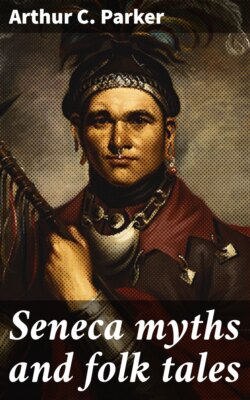Читать книгу Seneca myths and folk tales - Arthur C. Parker - Страница 15
На сайте Литреса книга снята с продажи.
BASIC PREMISES OF SENECA FOLK-LORE.
ОглавлениеTable of Contents
The myths and legends of the Seneca are built upon certain well recognized and deeply rooted postulates. Each bit of folk-lore must have its consistency adjudged by these elements in order to be credible. Any myth or legend that offended the standards so set would immediately be rejected by the Seneca as spurious. To a large extent the premises of folk-lore are founded on folk-thought, and woe to the innovator who sought to direct his theme from the accepted thought patterns.
Among the basic beliefs upon which the folk-tale is built are the following:
Unseen spirits. Spirits pervade all nature and affect man for good or evil. Their desires and plans must be satisfied by man. There are both good and evil spirits. Spirits may inhabit anything in nature.
Conflict of good and evil spirits. Good spirits are constantly making war upon evil spirits.
Magical power. There is such a thing as orenda or magical power. Such power makes its possessor the master over the natural order of things. This orenda may be acquired in various ways. It may be residual, and therefore an attribute of the individual, or it may be inherent in some charm or fetish. Virtuous persons may be given a good orenda, which is always more powerful in the end than the evil orenda which is possessed by witches and sorcerers.
Transformation. Any being possessing orenda may transform himself into any form,—animate or inanimate, as his orenda gives power. Anything seen in nature may be a temporary or a permanent transformation of a being having orenda. Transformation may be by command or by entering the skin of the creature whose form one desires to assume. Animals having orenda may assume human form and mingle with human beings. A group of people, therefore, may in reality be a transformed group of animals, and likewise with individuals.
All nature is conscious. Everything in the Seneca philosophy lives and is conscious. It is a being and in communication with other parts of nature. Anything in nature may be spoken to and it will hear what one has said. It may be induced to act in one’s behalf.
All living creatures have souls. The Seneca believes that animals have souls that are alike in their nature to the souls of human beings. The hunter, therefore, propitiates the soul of the animal he kills, and explains why he killed it. The souls of friendly animals help man, if man has been courteous, and has properly propitiated them. Souls of evil animals injure men and must be “bought off.” The souls of all creatures return to the Maker of Souls just as man’s does.
Master of souls. There is in the heaven world a Master of life and soul. He allows his subordinate spirits to rule the earth-world and concerns himself generally with his own realm. Souls that return to him are taken apart and readjusted that they may function properly in the immortal realm. Evil is therefore conceived in a measure as a maladjustment of the soul’s parts.
Ghosts. The manes of departed men and animals wander over their familiar haunts and startle men by their “materializations.” Wandering ghosts generally want something and must have their desires satisfied. The evil of the living person is intensified in the ghost. A ghost is the body spirit and not the real psychic personality.
EDWARD CORNPLANTER—SOSONDOWA
Leading chief of the Cattaraugus Wolf Clan and High Priest of the Ganiodaiu religion. Mr. Cornplanter was probably the last of the New York Iroquois who knew by heart every one of the ancient ceremonial rituals. He died in June, 1918, aged 67, and was buried near the Newtown Long House.
Dreams. Dreams are experiences of the soul as it leaves the body during sleep. The dream god guides the soul to its dream experience. Dreams that prompt the individual to certain desires must be interpreted by a chosen person or by volunteer guessers, and the desire must be satisfied, or calamity will befall the dreamer as well as the unsuccessful guesser. Prophetic dreams must guide action and dream demands must not be lightly set aside.
Monsters. There are monsters that men seldom see. These affect the welfare and the destiny of man. They are generally evil and seek to destroy and sometimes to eat human beings.
Wizards. There are such beings as wizards, witches and sorcerers. These beings possess an evil orenda and seek to destroy innocent people.
